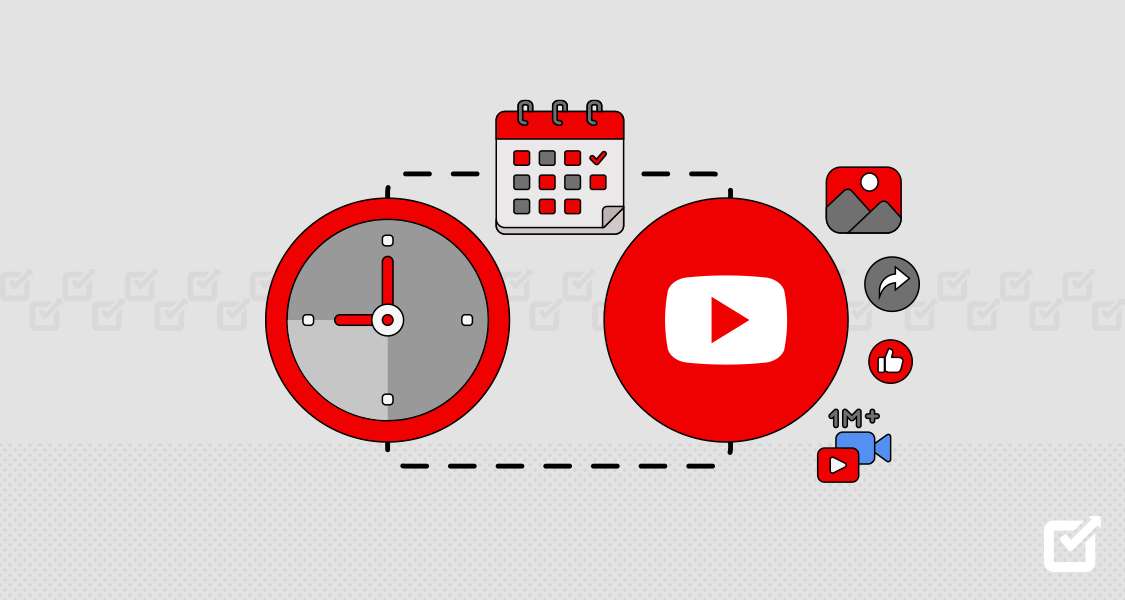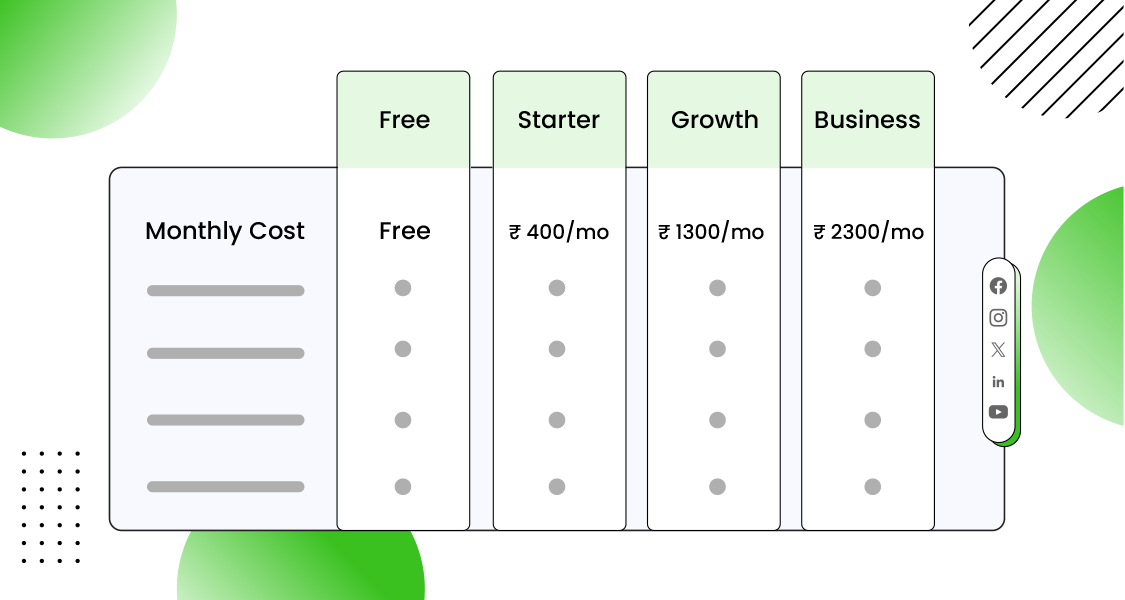Imagine you’re a lawyer, accountant, or consultant offering top-notch services, but potential clients can’t find you online.
This is a common problem for many professionals.
Without a clear digital marketing strategy for professional services, you risk losing clients to more visible online competitors.
In fact, 89% of businesses are now prioritizing digital experiences to grow, and 75% of users say they judge a company’s credibility based on its website design.
The challenge?
Knowing where to start.
Digital marketing strategy for professional services firms can feel overwhelming, especially if you’re juggling client work and running a business.
But here’s the good news: You don’t have to figure it all out alone.
Tools like Social Champ, a powerful social media management tool, can simplify the process.
This blog post will uncover the latest trends, practical steps, and tools to help you create a winning digital plan for professionals.
By the end, you’ll have a roadmap to attract more clients, build trust, and grow your business in 2025 and beyond.
Let’s get into it!

Finding It Hard to Market Your Services Online?
With Social Champ, schedule posts, track performance, and stay ahead of the competition—all in one place.
Short Summary
- Many service providers struggle with online visibility, risking potential clients going to competitors.
- A strong digital plan builds trust and credibility and attracts the right audience.
- SEO, PPC, social media (especially LinkedIn), content marketing techniques, and email campaigns are key channels.
- High-quality content like blogs, case studies, and webinars establish expertise and authority.
- Social Champ simplifies social media management with automation, scheduling, and analytics.
- Online reviews and testimonials enhance credibility and influence potential clients’ decisions.
- Setting clear goals, tracking KPIs, and refining strategies ensure long-term success.
- A well-planned digital plan helps professionals thrive in 2025 and beyond.
Why Professional Services Need a Digital Marketing Plan?
Professional services companies operate on trust and credibility.
A digital marketing goal helps you build both.
Without a clear plan, your business might get lost in the sea of competitors who are already using digital tools effectively.
For example, a professional services marketing plan can help you showcase your expertise through blogs, case studies, and client testimonials.
Plus, it lets you target specific audiences, ensuring your message reaches the right people at the right time.
In 2025, businesses will find it hard to keep up with changing client expectations without this kind of strategy.
Featured Article: 8 Best Tools For Digital Marketers to Use in 2025
Key Components of a Successful Digital Marketing Strategy
A successful digital marketing plan for a professional services firm has several key parts that work together.
First, you need clear goals.
Do you want more leads, better brand awareness, or higher website traffic?
Your goals will guide your strategy.
Next, audience research is crucial.
Understand your client’s needs, preferences, and challenges so you can tailor your messaging to them.
Content is the main thing, so your professional services marketing plan should include high-quality blogs, videos, and social media posts.
Finally, analytics and tracking help you measure success and make smart adjustments to your strategy over time.
Best Digital Marketing Channels for Professional Services
Choosing the right channels is key to making your digital plan for professional services work.
Not all platforms are created equal, and professional services like law firms, accounting agencies, or consulting businesses need to focus on channels that align with their goals.
Here’s a breakdown of the best marketing channels for professional services firms and how they can help you grow your business:
-
Search Engine Optimization (SEO)
This is the backbone of any successful digital plan for a professional services firm.
It helps your website rank higher on Google, making it easier for potential clients to find you.
When someone searches for “accountant near me” or “business consultant in [city],” you want your website to appear on the first page of the results.
SEO involves optimizing your website with relevant keywords, creating high-quality content, and building backlinks from reputable sites.
For example, if you’re a lawyer, you could write blogs about common legal issues or create a guide on “How to Choose the Right Attorney.”
By focusing on SEO, you not only attract more visitors but also establish yourself as an authority in your field.
-
Pay-Per-Click (PPC) Advertising
If you’re looking for quick lead generation, PPC advertising is a great option.
It allows you to target specific keywords like marketing plans for digital agencies and display ads to users searching for those terms.
With PPC, you only pay when someone clicks on your ad, making it a cost-effective way to generate leads.
For instance, a consulting firm could run ads targeting keywords like “business growth strategies” or “management consulting services.”
The best part?
You can set a budget and track the performance of your campaigns in real-time, ensuring you get the most out of your investment.
-
Social Media Platforms (Especially LinkedIn)
Social media platforms like LinkedIn are ideal for professional services.
They allow you to network, share valuable content, and build relationships with potential clients.
LinkedIn, in particular, is a goldmine for B2B businesses.
You can join industry-specific groups, participate in discussions, and share thought leadership content.
For example, an accounting firm could post tips on tax planning or share client success stories to showcase their expertise.
Depending on your audience, other platforms like Twitter and Facebook can also be useful.
The key is to stay active and engage with your followers regularly.
-
Email Marketing
Email marketing automation remains one of the most effective ways to nurture leads and keep your audience engaged.
It allows you to send personalized messages directly to your clients’ inboxes, whether it’s a newsletter, a special offer, or a follow-up after a consultation.
For example, a consulting agency could send a monthly email with industry insights, case studies, or upcoming webinars.
The key to successful email marketing is segmentation.
Divide your email list into categories based on client interests, behavior, or demographics.
This way, you can send targeted messages that resonate with each group, increasing the chances of conversion.
-
Content Marketing
Content marketing is all about creating valuable, informative, and engaging content that attracts and retains your target audience.
This could include blogs, videos, infographics, eBooks, or webinars.
For instance, a law firm could create a series of videos explaining common legal terms or a guide on “What to Do After a Car Accident.”
By providing useful content, you not only educate your audience but also build trust and credibility, which are crucial for professional services.
-
Webinars and Online Events
Webinars and online events are excellent ways to showcase your expertise and connect with potential clients in real time.
For example, a financial advisor could host a webinar on “Retirement Planning Tips for 2025” or “How to Save for Your Child’s Education.”
These events allow you to interact with your audience, answer their questions, and demonstrate your knowledge, making them more likely to choose your services.
-
Online Reviews and Testimonials
Online reviews and testimonials play a significant role in building trust and credibility for professional services.
Encourage your satisfied clients to leave reviews on platforms like Google Business Profile, Yelp, or LinkedIn.
Positive reviews can influence potential clients’ decisions and help you stand out from competitors.
For example, a consultant with glowing testimonials about their problem-solving skills is more likely to attract new clients.
Featured Article: Effective Online Marketing Strategy in 2025: A Comprehensive Guide
How to Create a Winning Digital Marketing Plan for Your Business
Creating a winning digital strategy for professional services doesn’t have to be complicated.
With the right approach, you can build a plan that drives results and helps your business grow.
Here’s a step-by-step guide to help you create a strategy that works for your professional services business:
-
Understand Your Audience
The first step in creating a winning strategy is understanding your audience.
Who are your ideal clients, and what challenges do they face?
For example, if you’re a financial advisor, your clients might be small business owners struggling with cash flow management.
To get a clear picture, conduct surveys, analyze client feedback, or use tools like Google Analytics to study their online behavior.
Once you know your audience’s pain points, you can tailor your messaging to show how your services solve their problems.
This not only attracts the right clients but also builds trust and credibility.
-
Craft a Unique Value Proposition
What makes your services stand out from the competition?
This is your unique value proposition (UVP), and it’s a critical part of your digital strategy for professional services.
Your UVP should communicate the benefits of working with you.
For example, a law firm might emphasize its 95% success rate in winning cases.
Consider what sets you apart—your expertise, personalized service, or innovative solutions.
Your UVP should be front and center on your website, social media profiles, and marketing materials to grab attention and convince clients to choose you.
-
Choose the Right Channels
Not all marketing channels are created equal.
To reach your audience effectively, you need to know where they spend their time.
For example, LinkedIn is ideal for B2B professional services like consulting or accounting, while Instagram might work better for creative industries.
If your audience is active on Google, invest in SEO and PPC advertising to ensure your website appears in search results.
Email marketing is another powerful channel for nurturing leads and staying in touch with existing clients.
The key is to focus on the platforms that align with your audience’s preferences and your business goals.
-
Create High-Quality Content
Content is the foundation of any successful digital strategy for professional services.
It helps you educate your audience, showcase your expertise, and build trust.
For example, a consulting firm could publish blogs on industry trends, create videos with actionable tips, or host webinars on hot topics.
Your content should address your audience’s pain points and provide real value.
This positions you as a thought leader and keeps clients coming back for more.
Don’t forget to optimize your content for SEO by using relevant keywords as a strategy for digital marketing agencies to improve visibility.
-
Set Clear Goals and KPIs
What do you want to achieve with your digital marketing efforts?
Whether it’s generating leads, increasing website traffic, or boosting brand awareness, your goals should be specific and measurable.
For example, a goal like “Increase website traffic by 20% in six months” gives you a clear target to work toward.
Once you’ve set your goals, identify key performance indicators (KPIs) to track your progress.
Common KPIs include website visits, conversion rates, email open rates, and social media engagement.
Regularly reviewing your KPIs helps you understand what’s working and where you need to improve.
-
Test and Refine Your Strategy
Digital marketing is not a one-and-done process.
To stay effective, you need to test and refine your strategy regularly.
For example, if your email open rates are low, try experimenting with different subject lines or sending times.
A/B testing is a great way to compare different versions of your ads, emails, or landing pages to see what resonates best with your audience.
Use tools like Google Analytics or Social Champ to track performance and gather insights.
By continuously optimizing your strategy, you can ensure it stays aligned with your business goals and client needs.
-
Leverage Automation Tools
Managing a digital strategy for professional services can be time-consuming, but automation tools like Social Champ can simplify the process.
With features like automated posting and content scheduling, you can maintain a consistent online presence without spending hours every day.
Social Champ also offers analytics tools to track engagement and measure the success of your campaigns.
By automating repetitive tasks, you can focus on delivering exceptional service to your clients while your marketing runs smoothly in the background.
How Social Champ Simplifies Digital Marketing for Professional Services
Many professionals struggle with common problems like lack of time, inconsistent posting, and difficulty tracking campaign performance.
This is where Social Champ comes in.
Designed to simplify digital marketing, Social Champ offers a range of features that address these challenges and make your life easier.
Let’s explore how you can overcome the problems you face and level up your marketing efforts:
Lack of Time
Professional service providers often wear multiple hats, leaving little time for marketing.
How Social Champ helps:
- Automated Posting: Schedule your social media posts in advance and let Social Champ handle the rest.
- Content Calendar: Plan your posts weeks or even months ahead, ensuring consistency without daily effort.
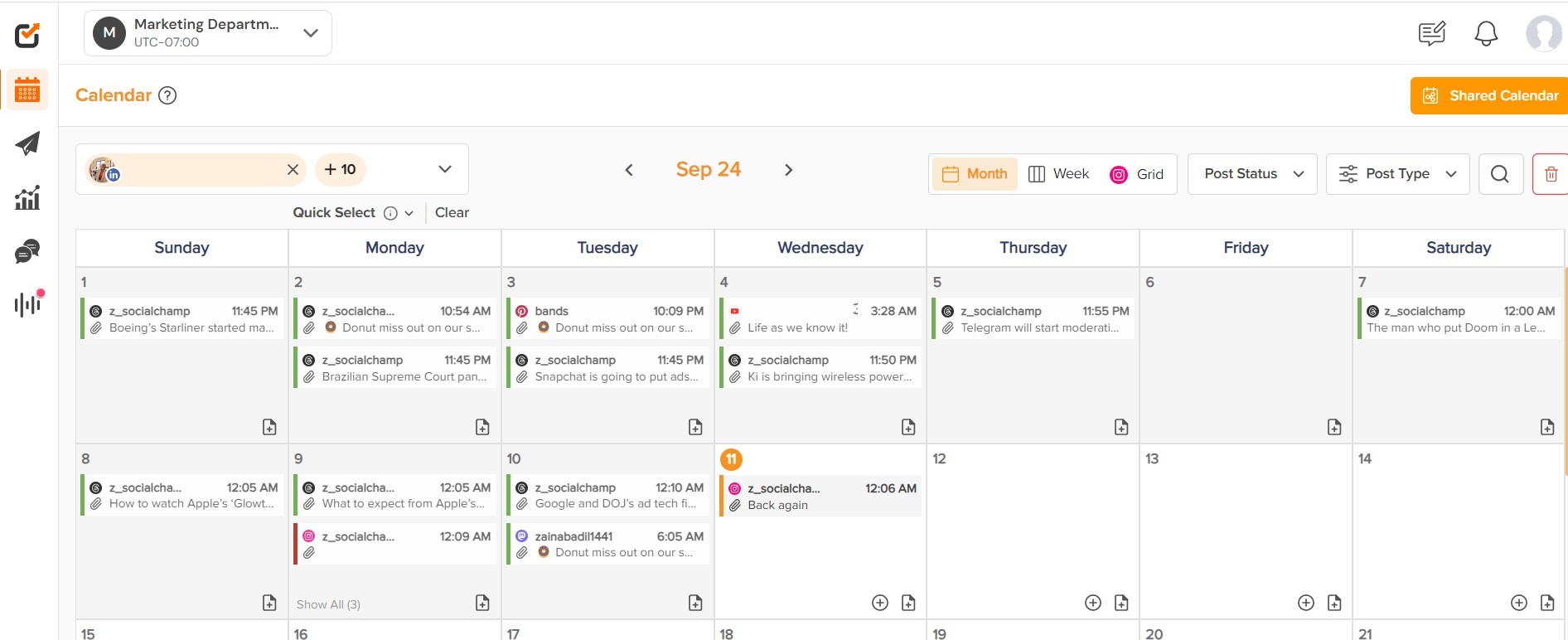
Social Champ’s Content Calendar
With these features, you can maintain a strong online presence without sacrificing time for client work.
Inconsistent Posting
Inconsistent posting can hurt your online visibility and engagement.
How Social Champ Helps:
- Scheduling Tools: Schedule posts across multiple platforms (like LinkedIn, Facebook, and Twitter) at optimal times.
- AI-Powered Suggestions: Get content ideas tailored to your audience, making it easier to stay consistent.
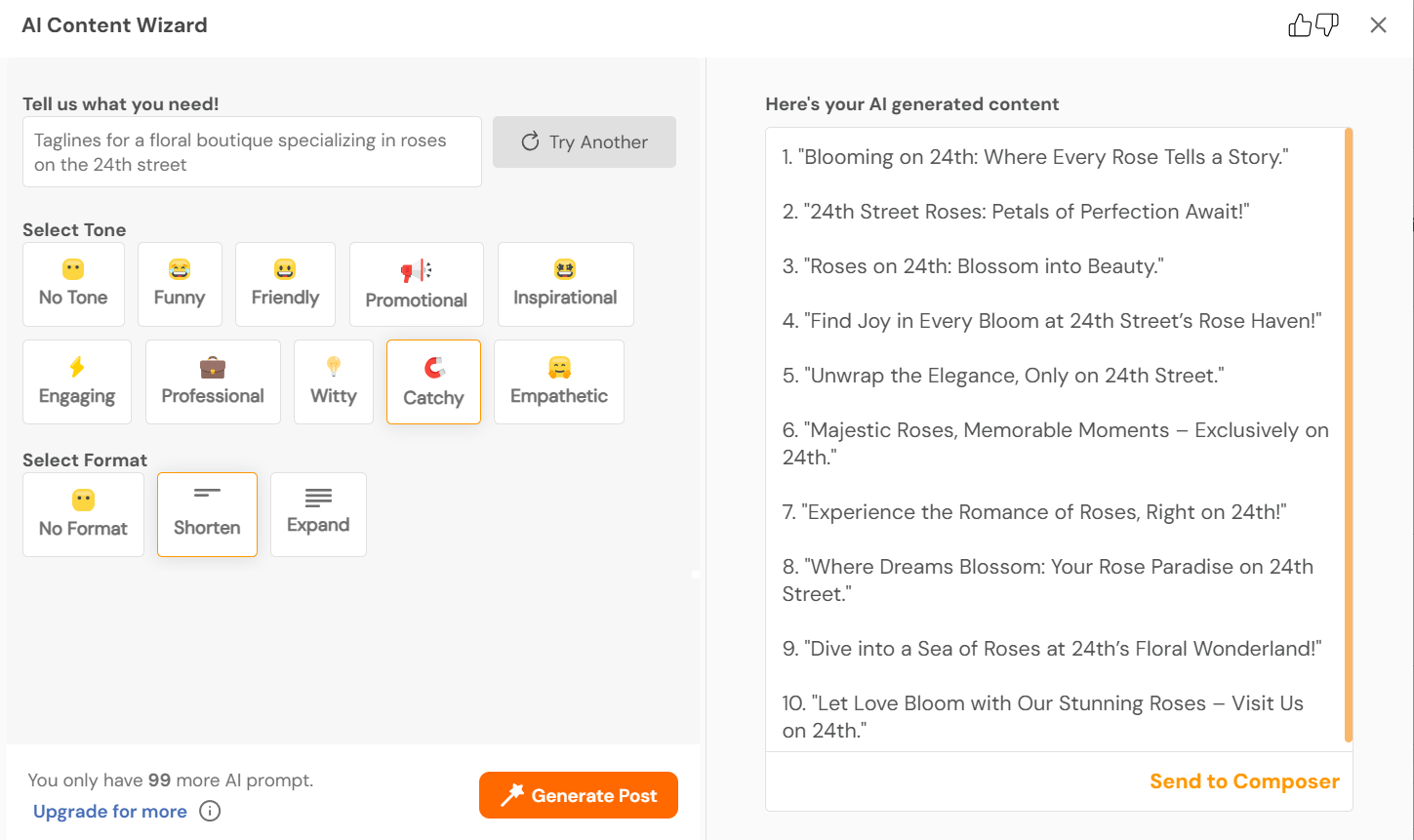
Social Champ’s AI Content Wizard Feature
By keeping your posting schedule on track, you can build trust and stay top-of-mind with your audience.
Difficulty Tracking Performance
Without proper analytics, it’s hard to know what’s working and what’s not.
How Social Champ helps:
- Analytics Dashboard: Track engagement, reach, and performance metrics for all your campaigns in one place.
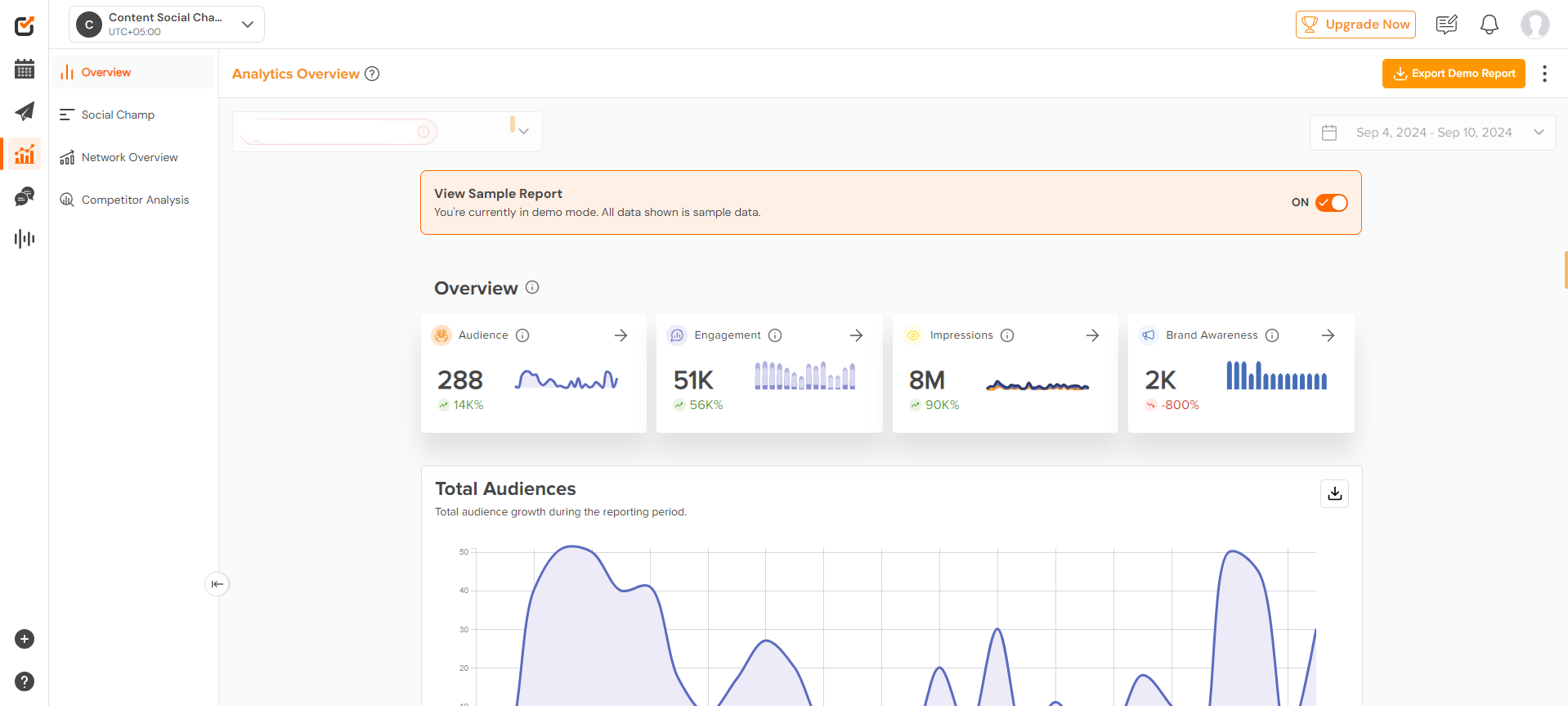
Social Champ’s Analytics - Custom Reports: Generate detailed reports to measure ROI and make data-driven decisions.
These tools help you understand your audience better and refine your strategy for better results.
Team Collaboration Challenges
Collaborating with team members on marketing efforts can be messy and disorganized.
How Social Champ helps:
- Team Collaboration Tools: Assign tasks, share content, and communicate with your team within the platform.
- User Roles and Permissions: Control access levels to ensure everyone works efficiently.
These features make it easy to execute your strategy for a digital marketing agency as a cohesive team.
Creating Engaging Content
Coming up with fresh, engaging content ideas can be a struggle.
How Social Champ helps:
- AI-Powered Content Suggestions: Get creative ideas for posts based on trending topics and your audience’s interests.
- Content Library: Store and organize your media files for easy access when creating posts.
With these tools, you can create content that relates to your audience and drives engagement.
Managing Multiple Platforms
Posting and managing accounts across multiple platforms can be time-consuming and confusing.
How Social Champ helps:
- Multi-Platform Management: Manage all your social media accounts from a single dashboard.
- Bulk Scheduling: Upload and schedule multiple posts at once, saving you hours of work.
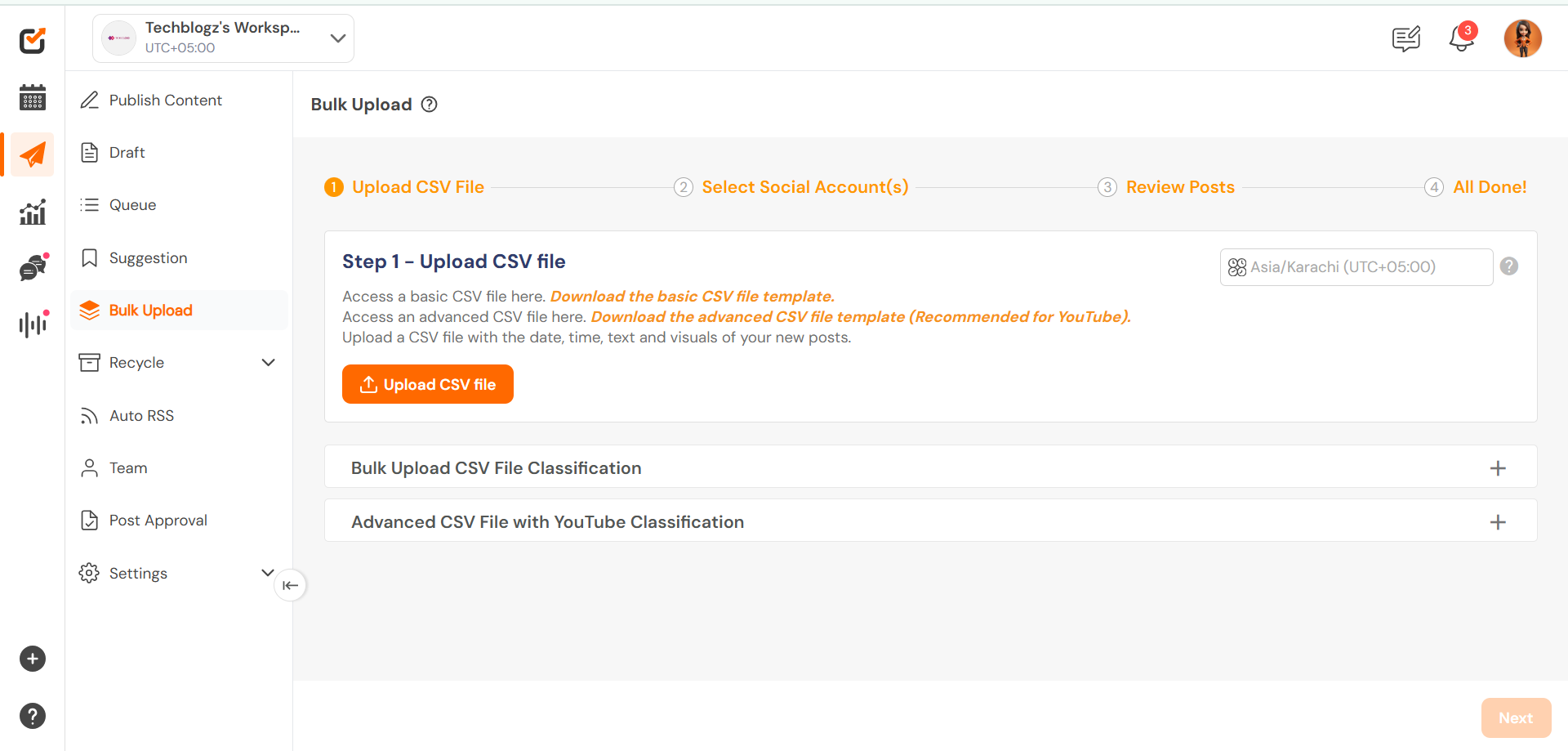
Social Champ’s Bulk Upload Feature
This feature ensures you stay active on all platforms without the hassle of switching between apps.
Staying Updated with Trends
Keeping up with the latest trends and algorithm changes can be overwhelming.
How Social Champ helps:
- Social Listening: Stay informed about trending topics related to you and hashtags relevant to your industry.
- Performance Insights: Learn which types of content perform best and adjust your strategy accordingly.
By staying ahead of trends, you can create timely and relevant content that captures your audience’s attention.

Tired of Inconsistent Digital Marketing Results?
Automate your strategy, analyze insights, and maximize impact with Social Champ’s powerful scheduling tools.
Conclusion
A well-planned digital marketing strategy for professional services can help you attract more clients, build trust, and grow your brand.
By choosing the right platforms, creating valuable content, and using tools like Social Champ, you can market smarter, not harder.
The key is to stay consistent, adapt to trends, and always focus on providing value to your audience.
Start refining your professional services today to stay ahead in 2025 and beyond.







